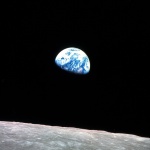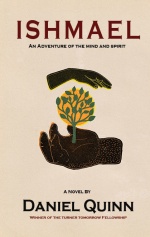This is a Shared World
December 10, 2022
Quote of the Week
"The future of life on Earth depends on our ability to see the sacred where others see only the common." --John Denver
A Pale Blue Dot

Look again at that dot. That's here. That's home. That's us. On it everyone you love, everyone you know, everyone you ever heard of, every human being who ever was, lived out their lives. The aggregate of our joy and suffering, thousands of confident religions, ideologies, and economic doctrines, every hunter and forager, every hero and coward, every creator and destroyer of civilization, every king and peasant, every young couple in love, every mother and father, hopeful child, inventor and explorer, every teacher of morals, every corrupt politician, every "superstar," every "supreme leader," every saint and sinner in the history of our species lived there--on a mote of dust suspended in a sunbeam.
The Earth is a very small stage in a vast cosmic arena. Think of the rivers of blood spilled by all those generals and emperors so that, in glory and triumph, they could become the momentary masters of a fraction of a dot. Think of the endless cruelties visited by the inhabitants of one corner of this pixel on the scarcely distinguishable inhabitants of some other corner, how frequent their misunderstandings, how eager they are to kill one another, how fervent their hatreds.
Our posturings, our imagined self-importance, the delusion that we have some privileged position in the Universe, are challenged by this point of pale light. Our planet is a lonely speck in the great enveloping cosmic dark. In our obscurity, in all this vastness, there is no hint that help will come from elsewhere to save us from ourselves.
The Earth is the only world known so far to harbor life. There is nowhere else, at least in the near future, to which our species could migrate. Visit, yes. Settle, not yet. Like it or not, for the moment the Earth is where we make our stand.
It has been said that astronomy is a humbling and character-building experience. There is perhaps no better demonstration of the folly of human conceits than this distant image of our tiny world. To me, it underscores our responsibility to deal more kindly with one another, and to preserve and cherish the pale blue dot, the only home we've ever known.
— Carl Sagan
Let us bid adieu to 2022 with this awe-inspiring reminder by Carl Sagan. Reading this well-known and powerful excerpt from his 1994 book of the same name, evokes our internal sense of scale. We reside on a tiny point like a planet hanging in the vast cosmos "a mote of dust suspended in a sunbeam". Equally so, it is precious in that it houses a diverse variety of living bodies and elements, and is the only one to do so. In a sense, immersing in this passage calls on our interspecies sensibilities as well; humans are only one node in the living network. This is a shared world.
Tip: listen to this passage here; possibly twice while closing your eyes in a quiet room or with ear plugs. See what emerges for you.
Reading Corner
 Title: Ishmael
Title: Ishmael
By: Daniel Quinn
Ages: 13 and above
This week we turn to a 1995 classic eco-fiction by Daniel Quinn, Ishmael. Written as a socratic dialogue between a telepathic Gorilla, Ishmael, and an anonymous narrator, this book foregrounds the idea that humans are a temporal phenomenon. To read Ishmael is to undergo a deep cultural inquiry into the lens with which we typically look at nature.
As one reviewer put it:
"Ishmael, the gorilla, represents the entirety of what humankind is trying to control. By making human the student and Ishmael the teacher, Quinn reverses the relationship of dominance that has characterized our approach to nature. In addition, by asking us to suspend our disbelief that a human can talk to a gorilla, the author is, in some sense, metaphorically challenging our belief that we are separate from other species.
...the reader can jump in at almost any point and get a sense of the nature of that inquiry. I carry a copy of Ishmael with me, and often just pick it up and start reading on any page. Within 10 or 15 minutes, I’m back into that flow of inquiry."
Best suited for early teenagers. More so, we invite you to go into this reading as a family, savoring the zen-like puzzles this novel offers and expanding your ecological literacy as a household.
Find a free copy at this labor of love project.
Be the Change
Invite teenage children to join you in looking around at your day to day life and identifying one entity like the water that gushes from the tap, the orange you savor as a fruit, the cheese you enjoy with your bread. Now, take some time to sense this object -- through touch, smell, sound, texture, color, etc. It may even bring up different memories for each of you. Take a moment to immerse yourselves.
Now, think about the (vast) journey this object / entity took in reaching you? What non-human and human forces played a role? E.g., could there be cheese without milk, milk without cows, cows without grass to eat, a ranch and cowherds for support, and so on. This is just to get you started; detail these links as much as you please and share them with each other. Better yet, write them out, sketch and draw in a journal to share as a family. Play around. Once done, see how generously a network of living creatures nourishes your life on a daily basis.





